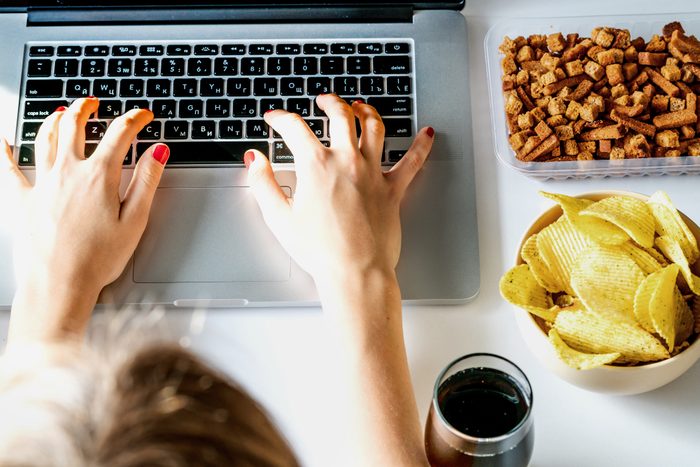Why We Undereat When We’re Stressed

Ignoring your hunger cues won’t make you more productive.
I used to think about food a lot. At any given time throughout the day, I’d be plotting my next meal. Invite me on a hike, and you’d learn I can’t tag along without eating first and bringing a backpack full of snacks to tide me over until my next meal. But then — as we’ve all said at one point throughout the last year-and-a-half — the pandemic hit.
After several months of working from home, I began delaying and then outright skipping meals, all in an effort to blast through my to-do list. There are days when I don’t take my first bite until 3:00 p.m, and by then, I’m battling a gnarly headache, feeling intensely emotional, unable to concentrate, and binging unhealthy foods into the evening.
Many people’s eating habits got turned upside down during COVID-19, thanks to pandemic-related stress. According to a 2020 report published in the European Journal of Investigation in Health, Psychology and Education, people are reporting more unhealthy eating practices during the lockdowns, with 25 percent skipping meals.
So, why exactly do we delay eating in times of stress, and how do we snap ourselves out of it?
(Related: How Can I Make Sure My Kid Has a Healthy Relationship With Food?)
How stress affects our appetite
When we experience stress, our bodies release adrenaline and cortisol, which are the hormones responsible for regulating our appetite. When this happens, our bodies go into fight-or-flight mode. Historically, this served humans well when we had to run away from a predator, but today, even when there’s no serious threat, our bodies can still activate this mode. For some, this results in the body halting digestion and hunger and reallocating that energy to either fighting or fleeing. After years of evolution, what used to be I cannot do anything but run became I cannot do anything but work.
Stress can not only make food less appetizing but also make it harder for the body to recognize feelings of hunger. “This is common right now because we’re not commuting the same way or on the same schedule as before,” says Victoria Shanta Retelny, a registered dietitian nutritionist in Chicago. “Our pattern of eating has been thrown off with working from home and the anxiety of what the future will bring.”
According to Retelny, each person’s physiological response to stress is different. Some overeat, while others undereat. This is determined by a combination of genetic factors and learned childhood behaviour.
(Related: 8 Women Share the Impact the Pandemic Has Had on Their Mental Health)
Acute stress versus chronic stress
The type of stress you’re under matters, too, when it comes to how it will affect your appetite. Chronic stress tends to provoke binge eating, while acute stress is typically the culprit for a suppressed appetite. Acute stress triggers our sympathetic nervous system, which releases adrenaline and noradrenaline. We might think putting off meals will help us get more work done, but in reality, the opposite will happen.
“Not eating stresses the body,” says Retelny. “You’re not fueling yourself to be productive.” And if the whole reason you’re delaying eating is so that you can be more productive, it’s easy to see how you can get caught in a vicious cycle. It’s crucial, Retelny says, to “understand that productivity starts with food.”
(Related: 4 Ways to Prevent Overeating When You’re Working from Home)
Strategies for undereaters in times of stress
Retelny says that undereaters will fit food in “as a side note,” when they should be prioritizing it. The good news is this behaviour can be unlearned. First, start by addressing the root cause of your undereating. “The key is to thwart stress before it becomes a problem,” says Retelny. You want your body to remain in a state of homeostasis, AKA your body’s ability to maintain internal stability despite what is going on around you. This will allow you to develop, recognize, and respond to your hunger cues even when there are external stressors at play. Structure your day with proper eating breaks, plan your meals and snacks ahead of time, eat within an hour of waking up, and perhaps most importantly, get regular exercise.
“The more you’re connected to your movement and body, the more you’re going to think about what you’re putting in your body,” says Retelny. For undereaters, exercise can be especially helpful because of its metabolism-boosting benefits. When we don’t fuel our bodies, our metabolism slows. When you’re active, you burn more calories, which means you end up feeling hungrier — and that sensation is harder to ignore. Being sedentary can dull your hunger cues, whereas exercising can help bring them back to life.
My goal going forward is to commit to daily movement, whether that’s a 20-minute walk around the block or an hour-long hike, to help make my hunger cues more noticeable so I can’t ignore them. Work can wait — and I’ll be more productive when I get back to it.
Next, this is how one Canadian woman embraced her pandemic weight gain and intuitive eating.




